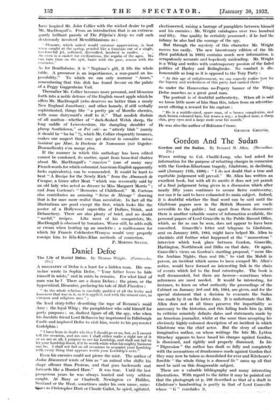Gordon And The Sudan
WHEN writing to Col. Chaill6-Long, who had asked for information for the purpose of rebutting charges in connexion with the Gordon-Khartoum tragedy, Gladstone, in declining, said (January 11th, 1890) : " I do not doubt that a true and equitable judgement will prevail." Mr. Allen has written an excellent book, but with all its merits it does not yet permit of a final judgement being given in a discussion which after nearly fifty years continues to arouse fierce controversy, nor can it be said to have exhausted its main subject. Indeed, it is doubtful whether the final word can be said until the Gladstone papers now in the British Museum are made accessible to the public ; but apart from these documents there is another valuable source of information available, the personal papers of Lord Granville in the Public Record Office, which, so far as can be seen, floes not appear to have been consulted. Granville's letter and telegram to Gladstone, sent on January 18th, 1884, might have helped Mr. Allen to elucidate still further what happened at the " momentous " interview which took place between Gordon, Granville, Hartington, Northbrook anti Dilke on that date. Or again, Granville's views on Gordon's startling proposal, " more like the Arabian Nights, than real life," to visit the Mandi in person, an incident which seems to have escaped Mr. Allen's notice, would have formed an interesting link in the chain of events which led to the final catastrophe. The book is well documented, but there are facunac—sonietimes where references are most needed. It would be interesting, for instance, to learn on what authority the proceedings of the Cabinet on January 3rd and 4th, 1884, are given, and for the special statement that a decision to evacuate the Sudan was made by it on the latter date. It is unfortunate that Mr. Allen does not at all times preserve the impartiality so necessary to the historian, and this failing leads him (p. 850) to criticize minutely definite dates and statements made by an American journalist, whilst at the same time accepting his obviously highly-coloured description of an incident in which Gladstone was the chief actor. But the story of another imaginative author, on whose writings the late Mr. Lytton Strachey appears to have based his charges against Gordon, is dismissed, and rightly and properly dismissed. ' In his " Digression " the author has dealt so fully and completely with the accusations of drunkenness made against Gordon that they may now be taken as demolished for ever and Kitchener's forcible " the whole thing is a damned lie" sums up all that need be said on this disagreeable subject.
There are a valuable bibliography and many interesting illustrations. With regard to the latter it may be pointed out that the photograph at p. 266 described as that of a draft in Gladstone's handwriting is partly in that of Lord. Granville whose " G " coneludes




































 Previous page
Previous page